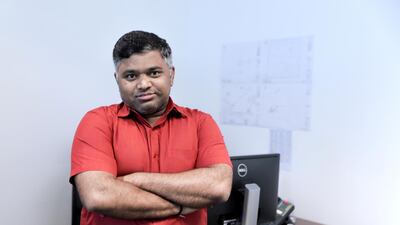More than 12,000 UAE residents have donated their blood to those in need so far this year, officials revealed on Thursday.
In 2018, the Sheikh Khalifa Medical City in the capital collected almost 37,000 units of blood – up from 35,000 in 2017.
Despite the growing number of donors happy to volunteer their time, more blood is always needed in the Emirates, medical experts said.
Rare blood in particular - such as O-, A- and AB- - is always required to hold in reserve.
“Yes we are satisfied with the numbers [of donors] but we are in continuous need of more blood,” said Dr Naima Oumeziane, medical director of Abu Dhabi Blood Bank.
“We have to increase our blood collection because our needs are rising due to new hospitals opening, new transplant programmes and new technologies.”
More than 29,000 residents across the UAE donated blood in 2018, up from almost 27,000 the previous year.
Rare blood is always sought after to ensure hospitals have enough available if three or four patients with the same type require treatment at the same time.
If properly stored, red blood cells expire after 42 days, while platelets, cells which circulate within the blood, have a shelf of five days.
Plasma, the liquid element of blood that carries cells and proteins through the body, can be stored for up to a year.
“Blood contributes to the treatment of a lot of patients and there are many patients who depend on this blood for their survival,” said Dr Oumeziane.
Currently, a donor bus from the Abu Dhabi Blood Bank heads out to government and private organisations to collect blood nearly every day.
Dr Oumeziane said more than 60 percent of donations come from this collection method and that the target was to have a supply of blood for eight to 10 days.
Women, however, continue to donate less than men and currently constitute just 14 per cent of total donors in the UAE.
This is often because a poor diet and menstruation can lead to anemia - meaning a low red blood cell count - which makes donations unsuitable.
“The rare blood types are the negative groups such as O-, A- and AB-,” said Dr Oumeziane.
Vidhay Prakash, 37, from India, said he was often called on to donate blood because his type - O Rh-D - was one of the rarest in the world. Only one in 100,000 people share his blood group.
He started donating blood in 2004 while living in India, and continued after coming to the UAE in 2011.
“If you can save a life, why not?” the father-of-one said. He said he had donated blood a total of 43 times.
Taghreed Talib, 48, from the UAE, also has a rare blood type - type O-. She has donated blood 42 times.
“It’s like having a talent and wanting to share it with the world,” she said. “I feel blessed to have such a rare blood type.”

